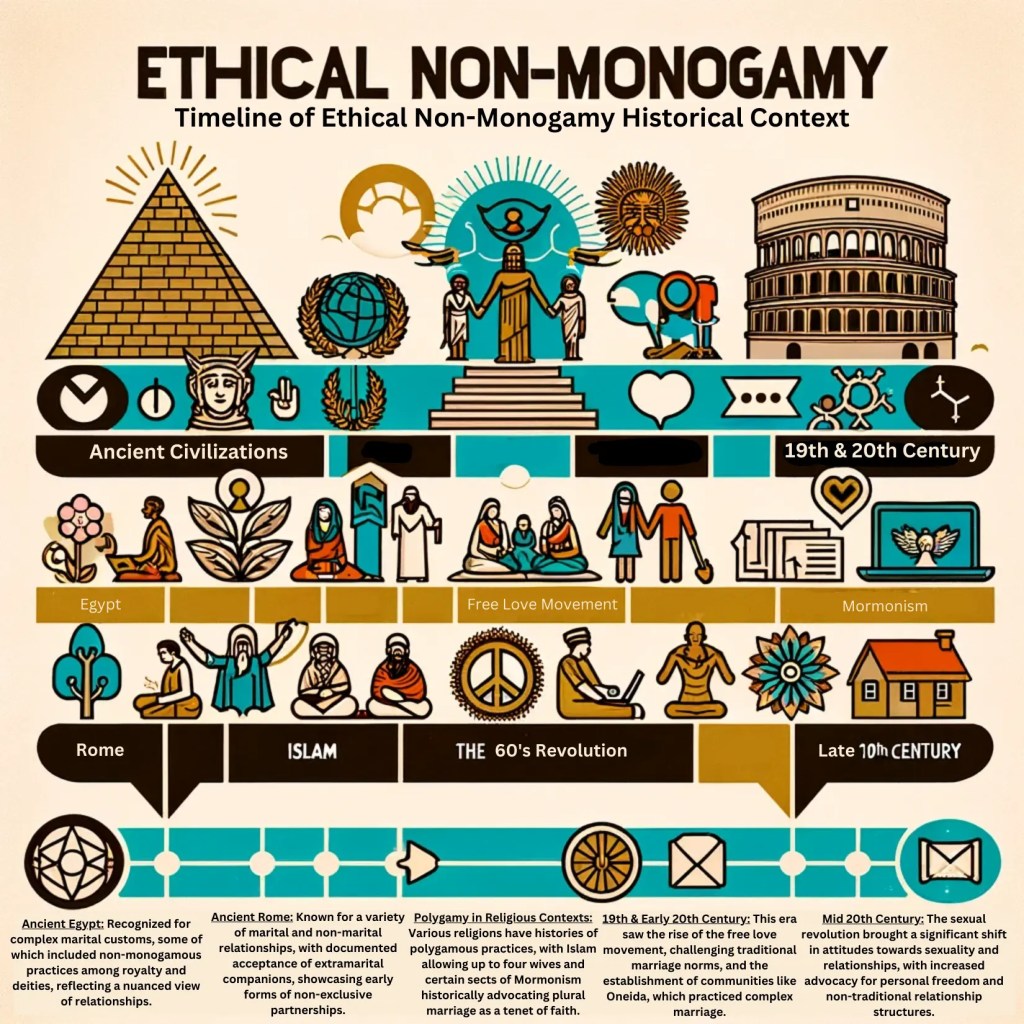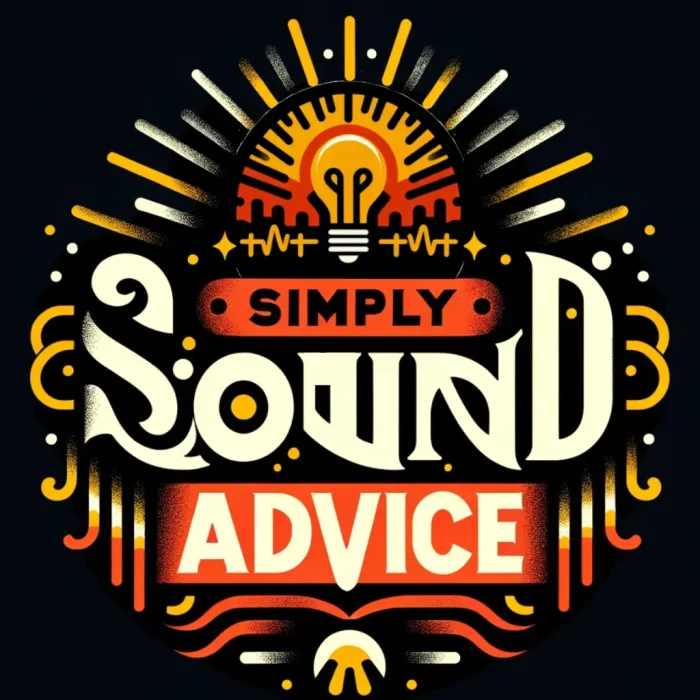- Mysteries of an ENM Relationship: Ethical Non-Monogamy
- Frequently Asked Questions About Ethical Non-Monogamy (ENM)
- The PolyQ Calculator: Calculate Your Openness to Polyamory!
- What is Ethical Non-Monogamy? A Closer Look at the Foundations of an ENM Relationship
- Different Classifications of relationships in ENM
- Historical Context of Ethical Non-Monogamy (ENM)
- Why Do People Choose ENM Relationships? Debunking the Myths and Unveiling the Benefits
- Portrayal of ENM in Media
- The Challenges and How to Navigate Them: Real Talk about ENM Relationships
- Navigating the Complex Issue of Infidelity in ENM Relationships
- Transitioning from Monogamy to ENM: A Step-by-Step Guide to Opening Up
- Managing Multiple Partners: The Juggling Act in ENM Relationships
- Time Management: It’s All About Prioritization
- Emotional Intelligence: The Silent Game-Changer
- Creating a Support System: More Than Just Partners
- Navigating Intimacy: One Size Doesn’t Fit All
- Technology to the Rescue: There’s an App for That!
- Case Study: Sarah’s Balancing Act
- Keep the Spark Alive: It’s Not Just Logistics
- Closing Thoughts: Mastering the Art of ENM Juggling
- When the Going Gets Tough – Things to Keep in Mind
- Resources and Further Reading
- Conclusion: Crafting a Fulfilling ENM Relationship is a Journey, Not a Sprint
Mysteries of an ENM Relationship: Ethical Non-Monogamy
Introduction: The Evolving Spectrum of ENM Relationships in Today’s Love Landscape

Let’s Talk About Ethical Non-Monogamy
Because two’s company, but three’s a community, right?
Explore the fascinating world of ethical non-monogamy, where relationships go beyond traditional boundaries and embrace a sense of community.
Love and relationships are like clay—malleable, ever-changing, and subject to various forms based on individual and societal influences. While monogamy has long been the conventional path, an alternative is gaining traction and changing the narrative: Ethical Non-Monogamy (ENM) otherwise known as consensual non monogamy.
With its promise of freedom, open communication, and unbounded love, ethical non-monogamous relationships are rewriting the rulebook of romantic engagements. This comprehensive guide aims to shed light on the intricacies of ENM, helping you navigate its complexities with clarity and confidence.
Check out our Simply Sound Society forum that provides a safe space for discussing ENM topics.
Frequently Asked Questions About Ethical Non-Monogamy (ENM)
- What is Ethical Non-Monogamy (ENM)?
- How common is Ethical Non-Monogamy?
- Is Ethical Non-Monogamy just about sex?
- Does Ethical Non-Monogamy mean the same as cheating?
- How do people practice Ethical Non-Monogamy?
- Why do couples choose Ethical Non-Monogamy?
- What are the different types of Ethical Non-Monogamy?
- Is Ethical Non-Monogamy accepted in society?
- Can jealousy occur in Ethical Non-Monogamous relationships?
- Can children be raised in a polyamorous relationship?
The PolyQ Calculator: Calculate Your Openness to Polyamory!
Ever wonder how suited you are to ethical non-monogamy (ENM)?
Well, meet the PolyQ Calculator where you just answer a couple of questions, then it generates a result just for you! This calculator is meant to help you explore your own preferences and boundaries, in determining how suited you are to polyamorous relationships.
The Polyamory Quotient (PolyQ) Calculator
Question 1: Do you believe in open and non-exclusive relationships?
Question 2: How comfortable are you with your partner being involved with others?
Question 3: Are you open to exploring emotional connections with multiple partners?
Question 4: How important is communication in your relationships?
Question 5: Can you handle jealousy and insecurity in a relationship?
Question 6: How do you handle scheduling and time management in relationships?
Question 7: Are you open to your partners having other primary relationships?
Understanding Your PolyQ Score
Your PolyQ score provides insights into your comfort and preferences in polyamorous relationships. A higher score indicates greater openness and comfort with polyamory.
- 15 – 35 Points: You may have some openness towards polyamory but prefer more traditional relationship structures.
- 36 – 50 Points: You’re likely comfortable with polyamory and might already be exploring or living in such relationships.
How to Use the Calculator
Simply answer all the questions by selecting the option that best represents your feelings or opinions. Once all questions are answered, click the ‘Calculate PolyQ Score’ button to see your score.
Remember, there are no right or wrong answers. This calculator is meant to help you explore your own preferences and boundaries.
What is Ethical Non-Monogamy? A Closer Look at the Foundations of an ENM Relationship
In a world where terms like “open relationship,” “polyamory,” and “swinging” have entered the mainstream lexicon, Ethical Non-Monogamy (ENM) stands as an umbrella term that encompasses them all. So, what is an ENM relationship?
But What Exactly Defines an ENM Relationship?
Unlike casual dating or secretive affairs, ENM represents a responsible and transparent approach to having multiple romantic or sexual partners. It’s grounded in mutual consent, ethical behavior, and clear communication between all parties involved.
What distinguishes ENM relationships is the ethical framework that prevents betrayal and enhances mutual growth. A couple or individual may choose this relationship style for various reasons, from a desire for more sexual relationships to emotional support or a sense of connected-ness. But one factor is common: the cornerstone of respect for every participant’s needs, wants, and boundaries.
Key Components of an Ethical Non-Monogamous Relationship
Through understanding these core principles, you can better assess if an ethical non-monogamous relationship aligns with your life objectives and emotional landscape.
Different Classifications of relationships in ENM
Different Types of ENM Relationships
- Open Relationships: A relationship where partners agree that they may engage in sexual, but not romantic, relationships with other people.
- Monogamish: A primarily monogamous relationship with allowance for occasional sexual activity outside of the partnership.
- Relationship Anarchy: A philosophy that emphasizes autonomy, with relationships formed on the basis of mutual desire without set rules or expectations.
- Swinging: Partners in a committed relationship engage in sexual activities with others as a form of recreation or social activity.
- Solo Polyamory: Individuals who pursue multiple relationships simultaneously but maintain an independent or single lifestyle.
- Polyamory: Engaging in multiple loving relationships with the consent of all parties involved. Emphasizes emotional connection and commitment.

Hierarchical vs. Non-Hierarchical Relationships in Ethical Non-Monogamy
In the practice of ethical non-monogamy, relationships can be categorized into two main approaches: hierarchical and non-hierarchical.
Hierarchical Relationships:
Non-Hierarchical Relationships:
Key Takeaway:
- The choice between hierarchical and non-hierarchical approaches depends on personal preferences and the needs of those involved.
- Some prefer the structure and security of hierarchy, while others opt for the freedom and equality of non-hierarchy.
- Practicing Ethical non-monogamy allows individuals to design relationships that align with their values and desires.

Historical Context of Ethical Non-Monogamy (ENM)
The History of Non-Monogamy
Ancient Civilizations
Ethical Non-Monogamy (ENM), contrary to modern perceptions, has roots in ancient civilizations. For instance, in Ancient Egypt, Pharaohs often had multiple wives and concubines, with an expectation of equitable treatment and provision for all partners. Similarly, in Ancient Rome, while marriage was a monogamous institution, extramarital affairs were common and socially accepted, provided they did not disrupt the marital arrangement.
Polygamy in Religious Contexts
The concept of one person having multiple spouses, particularly polygyny (a man with multiple wives), has been a part of various religious and cultural practices. In Islam, men are permitted up to four wives, given they can equally support and treat them. Early leaders in Mormonism (Fundamentalist LDS) also practiced polygamy, believing it would secure a higher place in the afterlife.
19th and Early 20th Century
The term “ethical non-monogamy” traces back to the 19th century, emerging from social movements such as free love and utopian socialism. During this era, communities like the Oneida Community in New York and the Amana Colonies in Iowa experimented with non-monogamous relationships, challenging traditional monogamous marriage norms.
Mid 20th Century
The 1950s and 60s saw a surge in discussions about non-monogamous relationships. Influential figures like psychiatrist R.D. Laing and psychologist Abraham Maslow advocated for more open, emotionally honest relationships. The sexual revolution of the 1960s further expanded awareness and acceptance of non-traditional relationship forms, including open marriages.
Late 20th Century to Present
From the 1980s onwards, the non-monogamous community has grown significantly. The advent of the internet facilitated connections among people interested in ENM, leading to the creation of online forums and support networks. In the early 2000s, polyamory began gaining mainstream recognition, with public figures openly discussing their non-monogamous relationships.

Why Do People Choose ENM Relationships? Debunking the Myths and Unveiling the Benefits
It’s easy to form misconceptions about Ethical Non-Monogamy (ENM). For many (especially monogamous people), the idea of having multiple partners is often met with skepticism, primarily because it goes against societal norms centered around monogamy. But those who are in ENM relationships often find them rewarding for several reasons. In fact, recent studies show a 20% increase in people identifying as non-monogamous over the last five years.
Emotional and Sexual Diversity
One of the driving factors for choosing this type of relationship is the craving for emotional and sexual diversity. The human experience is vast, and ENM allows individuals to explore romantic connections with multiple people without violating trust or ethical boundaries.
Personal Growth
Personal growth is another substantial advantage. These types of relationships compel you to address insecurities and personal shortcomings. As a result, many find themselves becoming better partners and more rounded individuals through this relational structure.
Honest Communication
Transparency is non-negotiable in ENM relationships. This level of openness often leads to stronger emotional connections with all involved parties. Honest communication is the backbone that holds these complex relationship structures together, encouraging a more profound sense of trust than you might find in more traditional monogamous relationships.
Debunking Myths
Contrary to popular belief, ENM relationships aren’t an “easy way out” of commitment. They require rigorous emotional work, boundless empathy, and crystal-clear communication. Moreover, they’re not inherently dysfunctional or less satisfying; research suggests that these types of relationships can be just as fulfilling as monogamous ones, if not more so in certain aspects.
Relevant Statistics
According to a study published in the Journal of Marriage and Family, those in ENM relationships reported higher levels of satisfaction, trust, and commitment than their monogamous counterparts. Another study published in Archives of Sexual Behavior found that ENM participants were less likely to suffer from sexual jealousy.
The Bottom Line
The journey to understanding whether an ENM relationship is right for you involves dispelling myths and recognizing its potential benefits. We’ve debunked some of the common misconceptions and illuminated the rewards, from emotional diversity to unparalleled levels of communication.
Portrayal of ENM in Media
Analyzing Consensual Non-Monogamy (CNM) Representations
Analyzing CNM
With the growing prevalence of consensual non-monogamy (CNM), media representations have varied significantly. Some portrayals offer honest, human depictions, while others perpetuate stereotypes and stigmas. Understanding these diverse media portrayals is essential for promoting an accurate and compassionate understanding of CNM relationships.
Key Aspects for Assessing CNM in Media
Key Aspects for Assessing Consensual Non-Monogamy (CNM) in Media
When assessing CNM in media, several aspects are critical:
- Ensuring that relationships are consensually non-monogamous.
- Identifying commitment within relationships to counteract the myth that non-monogamous relationships are less committed than monogamous ones.
- Showcasing the diversity of CNM relationship structures beyond stereotypes.
Challenges in Media Representation
Challenges
CNM often faces challenges in media representation, where it’s either oversimplified or overly sexualized. Media portrayals should aim to depict CNM as morally neutral, avoiding the use of non-monogamy as a shorthand for negative traits or intentions.
Intersectionality in ENM Portrayals
Intersectionality in Portrayals
It’s important for media to address how non-monogamy intersects with other identities such as queerness, asexuality, class, race, and ethnicity. This helps in presenting a more inclusive and diverse representation of ENM.
The Challenges and How to Navigate Them: Real Talk about ENM Relationships
ENM relationships can be beautiful, fulfilling experiences. But let’s not kid ourselves; they come with their own set of unique challenges. Knowing what these are and how to navigate them is crucial for the health and longevity of your non-monogamous romantic connections.
ENM Challenges and Solutions
Emotional Management
Perhaps the most glaring challenge in ENM relationships is managing emotions. Love isn’t a finite resource, but time, attention, and emotional energy are. It takes a significant amount of emotional intelligence to ensure that each partner feels valued and secure.
Setting Boundaries
Boundaries are not just lines in the sand; they’re the foundations upon which healthy ENM relationships are built. The rules must be explicit, agreed upon by all parties involved, and open to reevaluation as relationships evolve.
Time Management
In a monogamous relationship, juggling time can be straightforward. In Ethical Non-Monogamous arrangements, you’re essentially managing a mini-community. Effective time management is not just desirable; it’s essential. Balancing quality time among multiple partners requires organizational skills worthy of a seasoned project manager.
Dealing with Social Stigma
There’s no getting around it: societal judgments can weigh heavily on those in Ethical Non-Monogamous relationships. Whether it’s disapproving looks or outright criticism, the external pressure can be exhausting and even damaging if not managed correctly.
Real-life Examples
Take the case of Sarah and Mark (names changed for privacy), a couple who’ve successfully navigated ENM for over five years. They hold monthly check-ins to discuss emotional needs, boundaries, and time commitments. Their proactive approach to open communication has allowed them to sidestep many of the common pitfalls that plague ENM relationships.
Expert Advice
Relationship experts advocate for continual education and communication as the keys to successfully navigating ENM relationships. Books like “The Ethical Slut” and “More Than Two” provide essential frameworks for managing the complexities involved in ethical non-monogamy.

Navigating the Complex Issue of Infidelity in ENM Relationships
Introduction to the Grey Area
If monogamy has a strict code for what counts as infidelity, ENM swims in grayer waters. Let’s tackle this tricky subject and shed light on how fidelity works when you’re ethically non-monogamous.
Setting the Rulebook
In ENM, fidelity isn’t always about exclusivity but more about sticking to the rules you and your partner(s) set. A cheat sheet can’t exist because each couple’s definitions can differ vastly—making open dialogues about boundaries crucial.
The Emotional and the Physical
Don’t assume ENM gives you a hall pass to forge deep emotional or intimate physical connections willy-nilly. Some ENM partners might see emotional affairs as more damaging than physical ones, or vice versa. It’s not one-size-fits-all.
The Missteps and the Misunderstandings
Think cheating is off the table in ENM? Think again. ENM relationships are not immune to breaches of trust and broken agreements. Just like in monogamy, going rogue can have serious consequences.
Making Amends and Moving Forward
So, someone stepped over a line? It’s not the end of the world, but it does mean it’s time for some serious conversation, accountability, and perhaps, rule revision.
Clear Boundaries, Clear Conscience
Ethical is the operative word in ENM. Navigating fidelity in a non-monogamous landscape may be complex, but it’s far from impossible. All it requires is open communication, mutual respect, and a willingness to adapt.
Navigating the challenges of ENM relationships requires honesty, emotional intelligence, and a knack for logistics. The good news? These challenges are not insurmountable. With the right resources and mindset, you can overcome them and experience the rich emotional and sexual diversity that ENM relationships offer.

Transitioning from Monogamy to ENM: A Step-by-Step Guide to Opening Up
Embarking on the journey from a monogamous to an ethically non-monogamous (ENM) relationship is a significant step. It requires careful planning, open communication, and a dash of bravery. If you’re ready to take the plunge but are wondering where to start, this comprehensive guide will light the way.
Got any tips or questions about starting an ENM lifestyle? Share them in the comments below!
Self-Assessment: Are You Ready?
Before opening up, it’s crucial to ask yourself: “Am I ready for this?” Take some time to evaluate your emotional readiness, time availability, and communication skills. If you find gaps, focus on self-improvement before stepping into the complex world of ENM.
Consult Your Partner(s)
Even if you’re game for ENM, remember it’s a team sport. Hold open and honest conversations with your existing partner(s) to ensure you’re on the same page. Failing to do so can cause resentment and damage trust.
Establish Boundaries and Rules
Much like a country needs laws, ENM relationships require clear boundaries and rules. Whether it’s about practicing safe sex or how to allocate time among multiple partners, spell everything out.
Take Baby Steps
Transitioning to ENM doesn’t have to happen overnight. Start by testing the waters, perhaps through dating apps specially designed for polyamorous or open relationships. You can also attend ENM events to acclimate yourself to the community and lifestyle.
Work Through the Jealousy
Jealousy is an inevitable emotion when opening up a relationship. Learn to identify it, understand its root cause, and communicate openly with your partner(s) about it. Many people find that facing jealousy head-on actually strengthens their relationships.
Case Studies and Success Stories
Tom and Jane (names changed for privacy) gradually opened up their relationship over two years. They started with “soft” rules, like only dating other people in the same city. As they grew more comfortable, they revisited and adapted their rules to better suit their evolving needs.
Seek Professional Guidance
The transition to Ethical Non-Monogamy can be complex, and professional guidance can offer invaluable insights. Relationship coaches and therapists specializing in polyamory and open relationships can be particularly helpful.
Closing Thoughts: Be Patient and Kind
Changing the fundamental nature of your relationship is a journey, not a sprint. Patience and kindness toward yourself and your partner(s) are crucial. As you navigate this transformation, you’ll encounter bumps, but the key is to view them as opportunities for growth and deeper connection.

Managing Multiple Partners: The Juggling Act in ENM Relationships
Balancing multiple partners in an ethically non-monogamous (ENM) relationship isn’t just a skill; it’s an art form. The finesse required to manage emotions, time, and commitments can be both challenging and rewarding. If you think it sounds like spinning plates while riding a unicycle, you’re not too far off.
Time Management: It’s All About Prioritization
In an ENM lifestyle, the phrase “so much to do, so little time” gains a whole new meaning. Managing your time efficiently becomes a critical skill. Utilize tools like shared calendars or specialized ENM management apps to keep everyone’s schedule in sync.
Emotional Intelligence: The Silent Game-Changer
Your ability to understand, manage, and express emotions will dictate the success of your ENM relationships. EQ (Emotional Intelligence) becomes a vital asset when you’re handling multiple emotional investments. According to experts, emotional intelligence can improve relationship satisfaction by up to 30%[1].
Creating a Support System: More Than Just Partners
In ENM, your support network shouldn’t be limited to your partners. Friends, family, and even online communities can offer invaluable emotional backup. Diversifying your support system ensures you’re not overly reliant on any single relationship.
Navigating Intimacy: One Size Doesn’t Fit All
The degree of intimacy you share with each partner might vary. Some relationships might be more sexual, while others are emotionally intense. Make sure each relationship is nurtured according to its unique dynamics.
Technology to the Rescue: There’s an App for That!
Today, there are apps specially designed for people in ENM relationships that help manage schedules, set reminders for special dates, and even mediate conflicts. Consider making technology your ally in this intricate relationship model.
Case Study: Sarah’s Balancing Act
Sarah juggles three partners, a full-time job, and a hobby-turned-side-hustle. She swears by a digital shared calendar and sets aside “me-time” to maintain her sanity. Her secret sauce? Transparent communication with all involved.
Keep the Spark Alive: It’s Not Just Logistics
While logistics are crucial, the emotional core of each relationship needs nurturing. Schedule regular check-ins with your partners to keep the emotional spark alive. Ignoring this aspect can lead to relationship decay, something no amount of time management can fix.
Closing Thoughts: Mastering the Art of ENM Juggling
Being in an ethically non-monogamous relationship demands a lot, but the rewards — emotional, psychological, and sometimes even logistical — are well worth the effort. If you’re committed to mastering the art of ENM juggling, you’ll not only enrich your own life but also bring joy and fulfillment to your multiple partners.

When the Going Gets Tough – Things to Keep in Mind
Overcoming Challenges in ENM Relationships
Communication Breakdown: The Root of All Problems
Open, honest communication is the bedrock of any successful ENM relationship. When communication fails, misunderstandings and conflicts arise. Address issues as they come, and avoid bottling up emotions that can explode later on.
Dealing with Jealousy: It’s Human, After All
Jealousy can affect anyone, even those deeply committed to an ENM lifestyle. What sets you apart is how you handle it. Do you let it eat at you, or do you address it head-on? Establish a safe space for discussing feelings of insecurity or jealousy.
Balancing Needs: The Emotional Seesaw
Keeping all your partners happy is akin to balancing on an emotional seesaw. It requires constant adjustment and readjustment. Make it a point to check in with your partners to ensure their needs are being met, and don’t forget about your own.
Unexpected Changes: The Only Constant is Change
Life events like moving cities, job changes, or health issues can throw a wrench into any relationship, including ENM ones. Anticipate these shifts and discuss them openly with your partners.
Case Study: Mike and the Unexpected Challenge
Mike, in a committed ENM relationship with three partners, faced the test when he had to move cities for work. Open communication and proactive planning helped all parties adjust to this new reality without any major hitches.
Future-proofing: Creating a Sustainable ENM Model
When it comes to ENM relationships, sustainability is key. Consistent check-ins, open dialogue, and mutual respect are ingredients for long-term success. Develop coping mechanisms and adaptability skills that will serve you well into the future.
Concluding Remarks: The Grit Behind the Glamour
ENM relationships may look alluring and liberating, but they require immense dedication, emotional labor, and relentless communication. Being well-prepared to tackle challenges will make your Ethical Non-Monogamy journey not just endurable but highly rewarding.
Resources and Further Reading

Books on Ethical Non-Monogamy:
- The Ethical Slut: A Practical Guide to Polyamory, Open Relationships, and Other Freedoms in Sex and Love by Janet W. Hardy and Dossie Easton: A fundamental guide discussing sexual freedom and polyamory.
- Building Open Relationships by Dr. Liz Powell: Offers interactive insights into managing open relationships with communication prompts and worksheets.
- Eight Things I Wish I’d Known About Polyamory Before I Tried It and Frakked It Up by Cunning Minx: A personal account of navigating polyamory, offering valuable insights for those exploring non-monogamy.
- More Than Two: A Practical Guide to Ethical Polyamory by Franklin Veaux and Eve Rickert: Discusses maintaining open communication in polyamorous relationships.
- A Happy Life In An Open Relationship by Susan Wenzel: Offers insights from a relationship therapist in an open marriage.
- The Polyamory Breakup Book by Kathy Labriola: Addresses the challenges and solutions in polyamorous relationships.
Podcasts on Ethical Non-Monogamy:
- Life on the Swingset: The Swinging & Polyamory Podcast: Explores swinging and polyamory with guests sharing their experiences.
- Multiamory: Hosted by relationship coaches, offering advice on navigating non-monogamous relationships.
- Amory Pod: Documents the life of a polyamorous couple, discussing challenges in non-monogamous relationships.
- Normalizing Non-Monogamy: Breaks stigmas around polyamorous relationships, featuring diverse guests.
- Polyamory Weekly: A lighthearted podcast discussing non-monogamy in a casual manner.
- Loving Without Boundaries: Focuses on polyamorous relationships, hosted by Kitty Chambliss.
Online Forums and Communities:
- Ethical Non Monogamy Forum (ENM Forum): Offers a platform for sharing user stories and experiences in ethical non-monogamous and polyamorous relationships. The forum provides case studies, blogs, and advice for both new and experienced individuals in ENM relationships.

Conclusion: Crafting a Fulfilling ENM Relationship is a Journey, Not a Sprint
Navigating the fascinating yet complex world of Ethical Non-Monogamy is no easy feat. From understanding the core principles to choosing the right model that suits you, every step is pivotal. And let’s not forget the constant need for transparent communication, handling jealousy, and balancing everyone’s needs.
Despite these challenges, ENM relationships offer a richness and depth that can be incredibly rewarding.
But remember, you’re not alone on this journey. For more tips, real-life stories, and expert advice on ENM and a range of other topics, don’t hesitate to join our community.
The Simply Sound Society forum is brimming with lively discussions and insights on Ethical Non-Monogamy relationships. Connect with like-minded individuals and experts who can provide advice tailored to your unique needs. Do you practice ethical non monogamy?
Ready for More? Dive deeper into the world of Ethical Non-Monogamy with our “How Polyamorous Are You?” quiz. Assess your readiness and aptitude for this alternative relationship model and discover facets of yourself you never knew existed.
Finally, don’t miss out on any updates, tips, or new articles. Follow us on our social media platforms for the latest scoop on everything you need for a fulfilling and enriching life.
Let’s build a community that thrives on sound advice and heartfelt support. Your journey towards a fulfilling ENM relationship begins here.

















